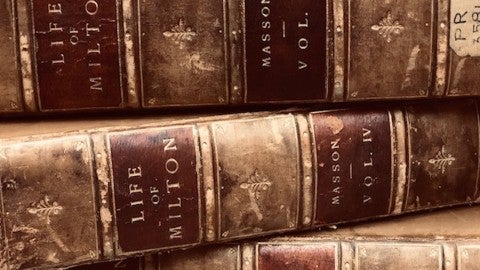 ENGL 113: Intro to Literary Editing & Publishing/Rice Review
ENGL 113: Intro to Literary Editing & Publishing/Rice Review
Tuesday 6:30-9:20 p.m.
>>Instructor: Ian Schimmel
>>CRN: 14364
Taught in the fall, this course is recommended to students desiring practical skills in the fields of literary editing and publishing. Experiential in nature, this class engages students in the real considerations and hands-on experience of publishing Rice’s nationally award-winning undergraduate literary journal, The Rice Review. Enrolled students will participate in weekly editorial meetings to read and discuss the merits of undergraduate submissions across literature’s three main genres: poetry, fiction, and creative non-fiction. Students will discuss a diverse group of submissions in the workshop setting, refine their editorial skills through written critiques, and enlarge their understanding of the editing process. Later in the term, students will become proficient with Adobe's InDesign layout software and create final magazine spreads that demonstrate an attention to the interplay of text and image. Students will also be asked to become practitioners of “literary citizenship.” This will come about through participation at outside literary events and through the hands-on experience of planning and hosting The Rice Review’s Spring Launch Event. All students will be considered official staffers for the magazine and will be acknowledged in that year’s annual issue. Course counts towards the English Creative Writing Major Concentration (ECRW) and the Minor in Creative Writing (CREW). Please reach out to ianschimmel@rice.edu with inquiries.
Satisfies:
English Creative Writing Concentration (ECRW)
Creative Writing Minor (CREW)
 ENGL 150*: Houston - Out on the Town
ENGL 150*: Houston - Out on the Town
Monday 6:30-9:00 p.m.
>>Instructor: Krista Comer
>>CRN: 16791
We venture into Houston’s literary and art scenes in order to think about the arts in the 21st century. We consider large questions about the relation of the arts to civic belonging, urban quality of life, and the economic infrastructures that underwrite art worlds. Students learn how to formulate historical and cultural analytic frameworks for the arts while receiving foundational instruction in close reading of literature and visual texts.
We take 3-4 field trips and transportation is provided. Our course meets on Monday evenings, and during class time we attend readings at the Alley Theatre sponsored by Houston’s premier literary arts organization, Inprint. Houston also supports a thriving grassroots literary world and we get acquainted with less-known venues and writing communities including Nuestra Palabra: Latino Writers Having Their Say. We take one Saturday field trip into Latinx neighborhoods in Houston’s East End to learn about murals, have lunch at a Mexican restaurant, and then visit Hermann Park’s public monuments. In our reading practices we explore the differences it makes to read literature “privately” (at home, curled up with a book) versus to read literature in preparation for an event to which we go as a group and which reveals the layers of sociocultural networks underpinning the experience of “private” reading. Open to majors and non-majors.
Satisfies:
*D1
Analyzing Diversity
Latin American Studies Major Elective
 ENGL 200*: Gateways to Literary Study (three sections offered)
ENGL 200*: Gateways to Literary Study (three sections offered)
Tuesday, Thursday 9:25-10:40 a.m.
>>Instructor: Timothy Morton >>CRN: 15281
Monday, Wednesday, Friday 2:00-2:50 p.m.
>>Instructor: Scott Derrick >>CRN: 16906
Monday, Wednesday, Friday 10:00-10:50 a.m.
>>Clinton Williamson >>CRN: 13338
This course is designed for and required of all prospective English majors, and should be taken in the first or sophomore year. Emphasis is on close reading, literary interpretation, and critical writing. Attention is paid to the major genres (poetry, drama, and fiction) across a range of historical periods. Open to all students with priority to declared majors and minors.
Note to all current and potential English majors/minors: Due to the popularity of ENGL 200, if the section of ENGL 200 you want appears to be full, please contact the instructor to receive a "special registration/override” via ESTHER.
Satisfies:
*D1
English major core requirement (ENGL): Training the Imagination
English minor core requirement (ENGM): Training the Imagination
Creative Writing concentration core requirement (ECRW): Training the Imagination
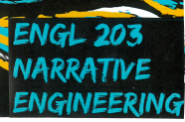 ENGL 203.001: Topics in Creative Writing: Narrative Engineering
ENGL 203.001: Topics in Creative Writing: Narrative Engineering
Wednesday 1:00-3:30 p.m.
>>Instructor: Tomás Q. Morín
>>CRN: 16859
De-colonizing design begins by owning your story. In this creative writing class, come learn how to express that story in different shapes. This course is open to all interested students but class size is limited.
Satisfies:
English Creative Writing Concentration (ECRW)
Creative Writing Minor (CREW)
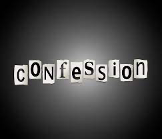 ENGL 203.002: Topics in Creative Writing: Confessional Writing
ENGL 203.002: Topics in Creative Writing: Confessional Writing
Tuesday, Thursday 10:50 a.m.-12:05 p.m.
>>Instructor: Andrea Bajani
>>CRN: 16872
An introductory, variable topics workshop in creative writing that asks students to work in multiple genres (fiction, non-fiction, poetry, etc.) Topic for Fall 2024 will be “Confessional Writing”. This course is open to all interested students. Class size is limited.
Satisfies:
English Creative Writing Concentration (ECRW)
Creative Writing Minor (CREW)
 ENGL 211*: British Literature: Romanticism to the 20th Century
ENGL 211*: British Literature: Romanticism to the 20th Century
Monday, Wednesday, Friday 1:00-1:50 p.m.
>>Instructor: Logan Browning
>>CRN: 16940
We will read from a variety of genres (lyric poetry, satire, novels, short fiction, drama, essays, etc.), and range chronologically from the English Romantics to Seamus Heaney and Eavan Boland. Our goal will be to understand more clearly what others have thought valuable in each text and why, so that we can understand more fully what evaluative criteria each of us applies to his or her own reading. We will also explore the various ways in which the relations among artist, audience, medium, and historical context manifest themselves in the texts under consideration, and the various strategies that authors have used to direct or control responses to their texts. Registration is open to all students!
Satisfies:
D1*
English major core requirement (ENGL): Historical Foundations
English minor core requirement (ENGM): Historical Foundations
English major specialization: Literature & Literary History (LLH)
 ENGL 222*: World and South Asia (cross-list ASIA 222)
ENGL 222*: World and South Asia (cross-list ASIA 222)
Thursday 9:25-10:40 a.m.
>>Instructor: Ragini Tharoor Srinivasan
>>CRN: 14400
How do we write “South Asia” in English? What is the relationship between South Asian literature and the literature of the Anglophone World? The South Asian subcontinent includes 8 or 10 independent nation states, depending on how you draw the map, which comprise nearly a quarter of the world’s population. These nations have different, historically Side-Up-Map of South Asia”, which challenges dominant modes of visualizing the region, this introductory course invites students to reconceive South Asia and its nations through English literature, on one hand, and to reconceive the literary through engagement with South Asian cultural production, on the other. Key topics will include colonialism, anti-colonial movements, and political violence; the nation, diaspora, and the global; postcolonial language politics and English’s relationship toSouth Asian vernaculars; sexuality, subjectivity, and sound cultures. Course is open to all students.
Satisfies:
*D1
Analyzing Diversity
English major core requirement (ENGL): Diverse Traditions
English minor core requirement (ENGM): Diverse Traditions
English major specialization: Culture & Social Change (CSC)
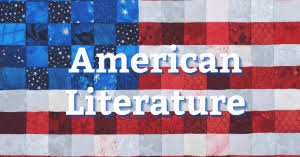 ENGL 260*: What is American Literature
ENGL 260*: What is American Literature
Monday, Wednesday, Friday 1:00-1:50 p.m.
>>Instructor: Clinton Williamson
>>CRN: 17064
A survey of representative U.S. authors from the 18th century to the present designed for both majors and non-majors.
Satisfies:
*D1
Analyzing Diversity
English major specializations: Culture & Social Change (CSC); Literature & Literary History (LLH)
 ENGL 269*: Science Fiction & the Environment (cross-list ENST 265)
ENGL 269*: Science Fiction & the Environment (cross-list ENST 265)
Tuesday, Thursday 4:00-5:15 p.m.
>>Instructor: Casey Williams
>>CRN: 15283
Examines the ways that science fiction has expressed and challenged ideas about nature, culture, society, and politics.
Satisfies:
*D1
English major specializations: Culture & Social Change (CSC); Science, Medicine, Environment (SME)
 ENGL 272*: Literature & Medicine
ENGL 272*: Literature & Medicine
Monday, Wednesday, Friday 11:00-11:50 a.m.
>>Instructor: Cameron Dezen Hammon
>>CRN: 14604
Designed for, but not limited to, students interested in the medical profession, this course introduces the study of medicine through reading imaginative literature--novels, plays, essays, poems--by and about doctors and patients, focusing on understanding ethical issues and on developing critical and interpretive skills.
Satisfies:
*D1
Analyzing Diversity
English major specializations: Science, Medicine, Environment (SME); Visual & Comparative Media (VCM)
Medical Humanities Minor-approved/eligible (MDHM)
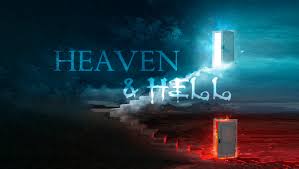 ENGL 274*: Heaven & Hell
ENGL 274*: Heaven & Hell
Monday, Wednesday, Friday 10:00-10:50 a.m.
>>Instructor: Benjamin Parris
>>CRN: 17489
This course examines the place of religious thought in literature and culture from the pre-modern to the modern world. Students will investigate how religious problems and questions--from an investment in a theological world view to the critique of God and providence--have shaped literary form and function. This course is open to all students.
Satisfies:
*D1
English major core requirement (ENGL): Historical Foundations
English minor core requirement (ENGM): Historical Foundations
English major specializations: Literature & Literary History
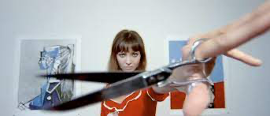 ENGL 286*: Classic & Contemporary Film (cross-list HART 286)
ENGL 286*: Classic & Contemporary Film (cross-list HART 286)
Tuesday, Thursday 10:50 a.m.-12:05 p.m.
>>Instructor: Ed Snow
>>CRN: 16792
In this course, we’ll study ten of the very best films that have been made around the world since 1930 (we won’t attempt silent cinema). Our goal will be to develop a nuanced appreciation for what it is about film that allows us to engage with it so deeply when it’s at its best. Our focus will be on details and our writing will emphasize description. Assignments and class discussions will typically concentrate on short, key sequences, single frames, and highly visual motifs. “Feelings” will also be essential: the idea is to connect with the heart of these movies, but to do so via “particular knowledge” (William Blake’s term) that requires us always to be looking. No prior expertise in film is necessary for immersion in this course. We’ll learn the nuts and bolts of film language as we proceed.
Satisfies:
*D1
English major specialization: Visual & Comparative Media (VCM)
 ENGL 300: Practices of Literary Study
ENGL 300: Practices of Literary Study
Tuesday, Thursday 9:25-10:40 a.m.
>>Instructor: Emily Houlik-Ritchey
>>CRN: 15285
This course explores the relation of literary and other cultural texts to key concepts in literary and cultural theory. In their reading and writing, students engage a variety of theoretical problems and modes of reading, among them close textual analysis, critical attention to representation of the (racial, gendered, sexual, class) subject, and what it means to read a text’s relation to philosophical traditions, power relations, history, and empire. ENGL 300 is to be taken after ENGL 200, ideally in the spring of the sophomore or fall of the junior year. Course is open to all students.
Satisfies:
English major core requirement (ENGL): Theoretical Concepts & Methods
 ENGL 301*: Intro to Fiction Writing (three sections offered)
ENGL 301*: Intro to Fiction Writing (three sections offered)
Monday 4:00-6:30 p.m.
>>Instructor: Rosa Boshier González
Wednesday 4:00-6:30 p.m.
>>Instructor: Rosa Boshier González
Tuesday, Thursday 1:00-2:15 p.m.
>>Instructor: Andrea Bajani
A course that teaches the fundamentals of fiction writing, and includes a mixture of reading and writing assignments. The goal is for each student to produce two short stories possessing imaginative ingenuity, structural integrity, and literary merit by the end of the semester. The course counts toward the English Creative Writing Concentration (ECRW). Seating is limited. Registration for odd-numbered sections is restricted to students who have declared the Creative Writing Major Concentration (ECRW); registration for even numbered sections is open to all undergraduate students in priority order. Seating is limited.
Satisfies:
*D1
English Creative Writing Concentration (ECRW)
Creative Writing Minor (CREW)
 ENGL 304*: Intro to Poetry Writing
ENGL 304*: Intro to Poetry Writing
Thursday 1:00-3:30 p.m.
>>Instructor: Tomás Q. Morín
An introduction to poetry writing through the study of contemporary poets and the writing of poems. The class will pay extensive attention to such elements of poetry as imagery, figurative language, tone, syntax, and form in order to create a vocabulary for students to discuss their own poems. Students' poems will be critiqued by the class in a workshop setting. Course counts toward the English Creative Writing Major Concentration (ECRW) and the Creative Writing Minor (CREW). Registration for odd-numbered sections is restricted to students who have declared the Creative Writing Major Concentration (ECRW); registration for even numbered sections is open to all undergraduate students in priority order. Seating is limited.
Satisfies:
*D1
English Creative Writing Concentration (ECRW)
Creative Writing Minor (CREW)
 ENGL 305*: Intro to Creative Nonfiction Writing
ENGL 305*: Intro to Creative Nonfiction Writing
Tuesday 2:30-5:00 p.m.
>>Instructor: Rosa Boshier González
A course in reading and writing creative nonfiction prose for the beginning writer. Sections may focus on a range of nonfiction genres or one specific form, e.g. personal essay/memoir, travel narratives, literary journalism, science and nature writing. Registration for even-numbered sections is restricted to students who have declared the Creative Writing Major Concentration (ECRW) or the Creative Writing Minor (CREW). Registration for odd-numbered sections is open to all undergraduate students. Seating is limited.
Satisfies:
*D1
English Creative Writing Concentration (ECRW)
Creative Writing Minor (CREW)
 ENGL 308*: Podcasting
ENGL 308*: Podcasting
Thursday 2:30-5:20 p.m.
>>Instructor: Ian Schimmel
This project-based course will lead us through an introduction to the ever-expanding medium of podcasting, specifically radio storytelling. We will unpack and discuss the techniques of practiced podcasters and use those elements in our own attempts at radio reportage: arts & culture shorts, vox pops, sonic ID’s, and short and long-form interviews. We will become proficient in capturing sound, interviewing strangers, writing scripts, pitching ideas for stories, and using GarageBand software to edit and shape that content. Registration for even-numbered sections is restricted to students who have declared the Creative Writing Major Concentration (ECRW) or the Creative Writing Minor (CREW). Registration for odd-numbered sections is open to all undergraduate students. Seating is limited.
Satisfies:
*D1
English Creative Writing Concentration (ECRW)
Creative Writing Minor (CREW)
English major specialization: Visual & Comparative Media (VSM)
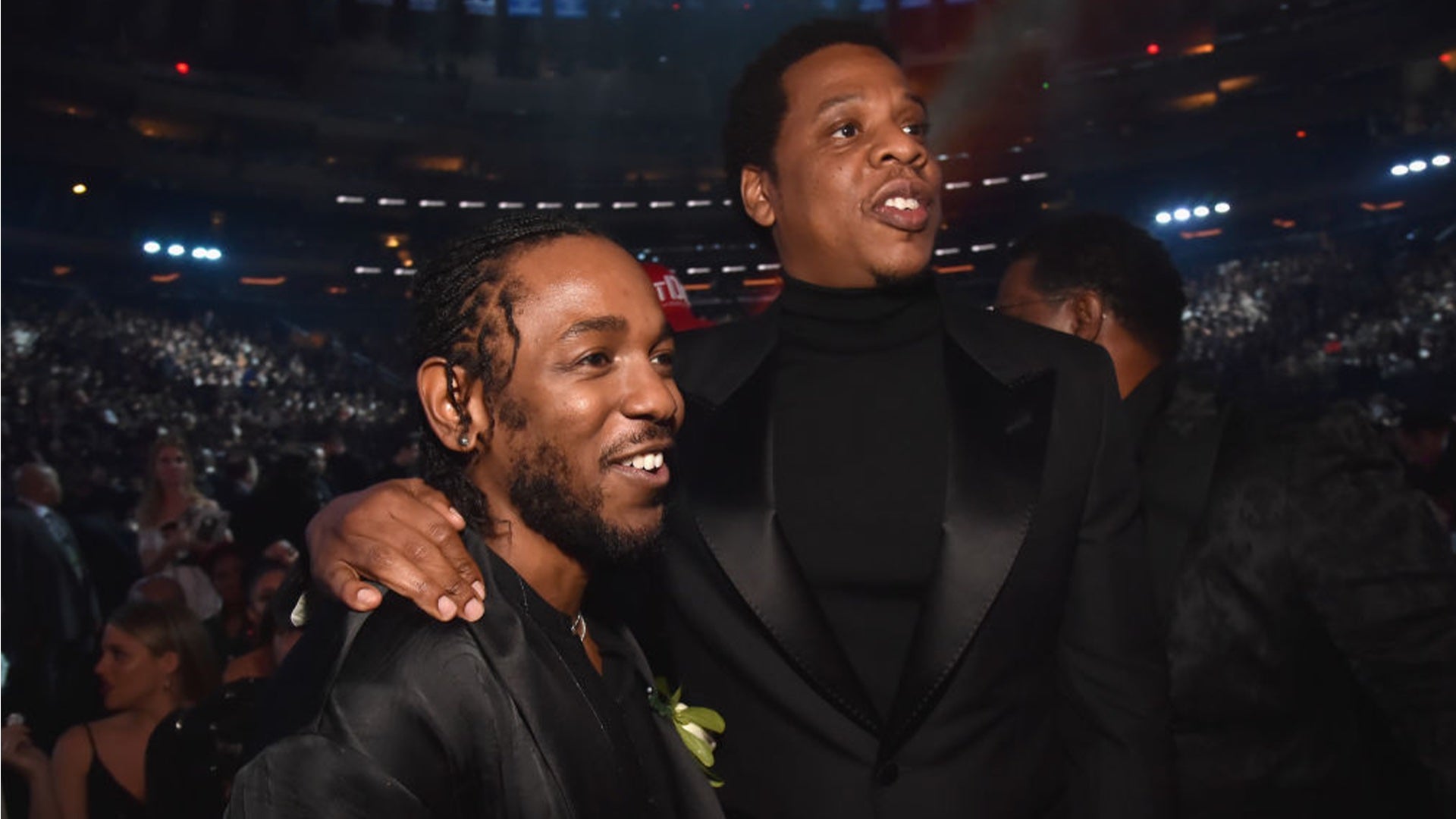 ENGL 309: Topics in Creative Nonfiction Writing - Verses/Versus: 4:44 vs. Mr. Morale and the Big Steppers (or 2017 vs. 2023)
ENGL 309: Topics in Creative Nonfiction Writing - Verses/Versus: 4:44 vs. Mr. Morale and the Big Steppers (or 2017 vs. 2023)
Thursday 4:00-6:50 p.m.
>>Instructor: Kiese Laymon
>>CRN: 16796
2017 and 2023 are monumental years in black music and cultural production. Jay Z’s 4:44 album was received as a response to Beyonce’s stratospheric Lemonade. For an emcee who is most known for his layered boasts, Jay-Z offered listeners a confessional unlike any we’d heard in hip hop in close to 50 years. Similarly, Kendrick Lamar's Mr. Morale and the Big Steppers shows Lamar adding another layer of confessional to his astounding lyrical offerings. Both albums, though differently, are exploring the relationship between personal and communal repair in the lives of black artists in the twenty-first century. This course will explore the foundations and possibilities of the confessional in black American music and literature. We will also ask hard questions. What are both albums doing with punishment, revelation, sorrow and joy? How are traditional conceptions of gender affirmed and/or exploded in these albums? If both albums are confessionals, what is being confessed and what are the consequences of that confession?
Satisfies:
English Creative Writing Concentration (ECRW)
Creative Writing Minor (CREW)
 ENGL 316*: Chaucer & Fanfic (cross-list MDEM 316; SWGS 305)
ENGL 316*: Chaucer & Fanfic (cross-list MDEM 316; SWGS 305)
Tuesday, Thursday 1:00-2:15 p.m.
>>Instructor: Emily Houlik-Ritchey
>>CRN: 16797
Medieval literature did not value “originality” in its storytelling the way we often do today. To retell someone else’s story–for the purposes of celebration, mischief, or aggression–was the epitome of high literary art in the medieval world. Chaucer’s Canterbury Tales is a playful nod in form and tone to Boccaccio’s Decameron, just as Henryson’s Testament of Cresseid is a rather angry reworking of Chaucer’s Troilus and Criseyde. Artists today continue to fanfic Chaucer, from the animated Canterbury Tales; to Patience Agbabi’s celebrated poetry collection, Telling Tales; to Ufuoma Overo-Tarimo’s Nigerian Pigin play The Miller’s Tale: Wahala Dey O! In this class, we will indulge our love of fanfic (which the medieval world shares) by considering fanfic as a mode of criticism and interpretation as well as mode of creative enjoyment. And we will write some! With Chaucer’s work as our inspiration, I promise that you’ll find plenty to inspire you: things to rave about, rant about, ridicule, and make your own.
Satisfies:
*D1
English major core requirement (ENGL): Historical Foundations - periods before 1800
English minor core requirement (ENGM): Historical Foundations - periods before 1800
English major specialization: Literature & Literary History (LLH)
 ENGL 322: Men & Women in Shakespeare
ENGL 322: Men & Women in Shakespeare
Tuesday, Thursday 1:00-2:15 p.m.
>>Instructor: Ed Snow
>>CRN: 16800
This course will span early to late Shakespeare. The linking theme will be one of the plays’ core concerns: the “difference” between men and women (and thus the difference that links them), especially insofar as it is defined and maintained by an anxious male order of things that Shakespeare’s women dangerously (but gloriously) exceed. Our method will be close reading. But since this is Shakespeare and drama, we will need to “hyper-read” along several axes at once (e.g., text, voice, acting, production), so that multiple possibilities will continually frustrate single-minded conclusions. For instance: when the defeated Cleopatra replies to Caesar’s messenger with the single syllable “oh,” how are we to understand this utterance? How many different ways can you (as the reader, as the imagined actor or director) choose to verbalize or “play” it? And how many corresponding answers are there to the questions it raises--e.g., what is she feeling? what is she thinking and/or plotting? what move is she making in this game of power politics?
Satisfies:
English major core requirement (ENGL): Historical Foundations - periods before 1800
English minor core requirement (ENGM): Historical Foundations - periods before 1800
English major specialization: Literature & Literary History (LLH)
 ENGL 333*: 18th-Century British Fiction
ENGL 333*: 18th-Century British Fiction
Tuesday, Thursday 10:50 a.m.-12:05 p.m.
>>Instructor: Betty Joseph
>>CRN: 16801
The “birth” of the English novel coincides with the emergence of capitalism as the dominant economic and social formation in eighteenth-century Britain. What do we make of the compelling links between this literary form, its preoccupation with the new economic ideologies and its use of plot, characters, themes and narrative techniques?
This course introduces you to significant works of the long eighteenth century, from Daniel Defoe’s Robinson Crusoe to Jane Austen’s Northanger Abbey. We will read across genres and narrative forms like the adventure tale, the criminal biography, the domestic novel, the utopian tale, the sentimental novel, and the colonial romance.
Satisfies:
English major core requirement (ENGL): Historical Foundations - periods before 1800
English minor core requirement (ENGM): Historical Foundations - periods before 1800
English major specialization: Literature & Literary History (LLH)
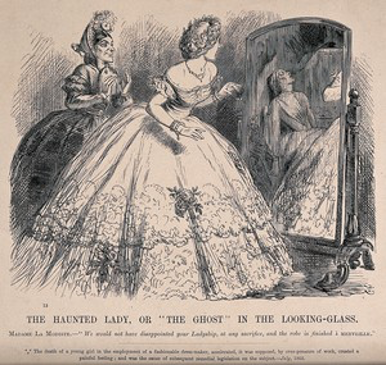 ENGL 342*: Victorian Fiction (cross-list: SWGS 372)
ENGL 342*: Victorian Fiction (cross-list: SWGS 372)
Tuesday, Thursday 9:25-10:40 a.m.
>>Instructor: Helena Michie
>>CRN: 16802
The Victorians come to us, as it were, in costume, exotic and eccentric forerunners of the comfortingly familiar. The women wear crinolines, and sometimes set them on fire. At home, they make seaweed paintings, play on the piano, and think of marriage. The men become captains of industry and assert the dominance of Empire. No one has sex, although there are lots of children.
This course debunks some of these myths while attempting to treat seriously the Victorians’ sameness and difference from us, as well as differences within the category of the “Victorian.” We will be looking specifically at how the many genres of the nineteenth-century novel think through ideas that are given new shape in the Victorian period: poverty, domesticity, equality, gender, landscape, sexuality, geopolitics.
This year, we will conduct an experiment in consuming novels as the Victorians often did—reading serially, one short monthly “part” at a time. Our text for serial reading will be Charles Dicken’s Dombey and Son.
The focus this year will be on the “hungry forties,” a decade of famine, political upheaval and failed revolution. We will read at least three novels from that decade—Dombey and Son, Elizabeth Gaskell’s Mary Barton, and Charlotte Bronte’s Jane Eyre.
Satisfies:
*D1
English major core requirement (ENGL): Historical Foundations - periods before 1900
English minor core requirement (ENGM): Historical Foundations - periods before 1900
English major specializations: Culture & Social Change (CSC); Literature & Literary History (LLH)
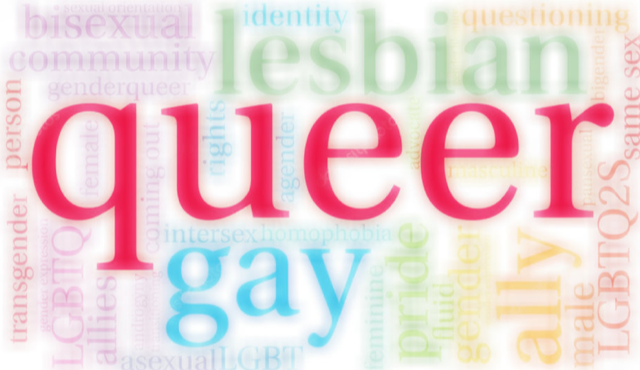 ENGL 354: Queer Literary Cultures (cross-list: SWGS 364)
ENGL 354: Queer Literary Cultures (cross-list: SWGS 364)
Wednesday 4:00-6:50 p.m.
>>Instructor: Carly Thomsen
>>CRN: 17129
What does it mean to look at the world queerly? What opens up when we approach queer as a verb rather than a noun? In answering these questions, we will examine taken-for-granted ideas about sexuality through focusing on the body, place and space, and contemporary LGBTQ politics. Queer theorists offer alternative ways of conceptualizing embodiment, argue that social logics are spatialized, and critique mainstream LGBTQ movements. In this class, we will explore how thinking differently about bodies, place, and politics creates new ways to understand sexuality—and vice versa. In so doing, we will consider how one’s sexuality has come to be a large part of one’s identity, desires for community, identity, and cultural recognition, and relations among social justice, equality, and rights. Our goal is to think “queerly” about sexuality and the various identities and experiences sexuality shapes and is shaped through, including race, gender, class, disability, geography and so on. Course texts include traditional academic articles, blogs, documentary films, and fiction.
Satisfies:
English major core requirement (ENGL): Diverse Traditions
English minor core requirement (ENGM): Diverse Traditions
English major specializations: Culture & Social Change (CSC); Literature & Literary History (LLH)
 ENGL 359*: Writing New Orleans - The City as Muse
ENGL 359*: Writing New Orleans - The City as Muse
Monday, Wednesday, Friday 1:00-1:50 p.m.
>>Instructor: Logan Browning
>>CRN: 16804
A remarkably diverse group of writers has drawn upon New Orleans and its environs as setting, inspiration, and example in the production of virtually every literary genre. Many of these authors, particularly those writing since the devastation of Hurricane Katrina, have tried to predict the city’s future or pronounce its doom. We will look at some of the more notable instances of this New Orleans writing and try to understand the relation between them and the city’s languages, ethnic identities, musical heritage, visual arts, festivals, and cuisines. We will also reflect on New Orleans as a significant site in recent conversations about the coronavirus and racism. Our reading will include Kate Chopin, The Awakening, Tennessee Williams, A Streetcar Named Desire, Walker Percy, The Moviegoer, John Kennedy Toole, A Confederacy of Dunces, Michael Ondaatje, Coming through Slaughter, Robert Olen Butler, A Good Scent from a Strange Mountain, Anne Rice, The Feast of All Saints, James Lee Burke, The Tin Roof Blowdown: A Dave Robicheaux Mystery, and Douglas Brinkley, The Great Deluge, as well as brief selections from a variety of other writers such as Oscar Wilde, Mark Twain, George Washington Cable, William Faulkner, and Eudora Welty. You will choose from a number of recent New Orleans texts for presentations to the class. Some good choices would be Nathaniel Rich’s King Zeno, Sarah Broom’s The Yellow House, Maurice Carlos Ruffin’s The Ones Who Don’t Say They Love You, Mitch Landrieu’s In the Shadow of Statues, and Natasha Tretheway’s Bellocq’s Ophelia, to name just a few. We will enjoy some good food, drink, and music while we’re at it. Course is open to all students!
Satisfies:
*D1
English major core requirement (ENGL): Diverse Traditions
English minor core requirement (ENGM): Diverse Traditions
English major specializations: Culture & Social Change (CSC); Literature & Literary History (LLH)
 ENGL 366: Bob Dylan-Music-Politics-Race
ENGL 366: Bob Dylan-Music-Politics-Race
Monday, Wednesday, Friday 10:00-10:50 a.m.
>>Instructor: Scott Derrick
>>CRN: 16805
It’s difficult to overestimate the importance of the changes the cultural chaos of the sixties produces in U.S. life, including the beginnings of second wave feminism; the beginning of the gay rights movement; the intensification of civil rights protests; black power movements; urban riots in major cities; the horror of Vietnam; conspiratorial assassinations; the moon landing (allegedly); celebrations of drug use; and protests, often violent, on college campuses across the nation. To a significant degree, sixties culture is fueled by an intensity of generational rebellion never seen before or since, and its preferred mode of expression, other than protesting itself, was music. At stake was the future of U.S. Culture and the nature and place of “politics” within it.
Our focus will be on one of the 60’s pivotal figures, Bob Dylan, who provides a crucial pivot point—July 12, 1965—between the politically-oriented folk music of the early sixties and the rock tradition that overwhelms it. While Dylan is without question a major figure (one who wins a Nobel Prize in 2016), he owes much of his importance to the quantity of the U.S. musical tradition he absorbs and channels, including earlier twentieth-century African American music. We will read Woody Guthrie’s Bound for Glory, a crucial text for the development of his early “bard of the people” persona, a selection of “beat” poetry, and Dylan’s own well-received memoir of his early career, Chronicles: Volume One (2004). We’ll ignore Dylan’s own attempts at filmmaking, but we’ll look at films about Dylan, including D.A Pennebaker’s Don’t Look Back (1967), which invents the “rockumentary” form, and Martin Scorcese’s No Direction Home (2005), a later addition to this genre. Requirements will include a short paper, a group presentation, and a final longer essay or creative project.
Satisfies:
English major specializations: Culture & Social Change (CSC); Visual & Comparative Media (VCM)
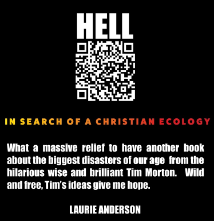 ENGL 368*: Literature & the Environment (cross-list ENST 368)
ENGL 368*: Literature & the Environment (cross-list ENST 368)
Tuesday, Thursday 1:00-2:15 p.m.
>>Instructor: Timothy Morton
>>CRN: 16806
All literature is environmental. This class explores why that is the case, and how to read all literature as having important things to say about the biosphere we inhabit. We will be studying the entire span of English Literature.
This fall, your Literature and the Environment class will be taught by Timothy Morton, author of 25 books, 45 translated into 19 languages, curator of two exhibitions on ecology (Texas and Spain) and creator of environmental art (WE ARE THE ASTEROID, the Hyperobject Suit), and more.
Satisfies:
*D1
English major specialization/s: Culture & Social Change (CSC); Science; Medicine; Environment (SME)
 ENGL 369: U.S. West and its Others (cross-list SWGS 329)
ENGL 369: U.S. West and its Others (cross-list SWGS 329)
Wednesday 2:00-4:50 p.m.
>>Instructor: Krista Comer
>>CRN: 16808
Using the U.S. West as a case study, this course focuses on concepts of place in literature and culture. We too are case studies in thinking about place: where are we from, how does it matter? What tools are needed to pursue discussions about the where of us? Our class time and our writing workshops help us learn about each other and our places.
Satisfies:
English major core requirement (ENGL): Diverse Traditions
English minor core requirement (ENGM): Diverse Traditions
English major specializations: Culture & Social Change (CSC); Science; Medicine; Environment (SME)
 ENGL 374: Cinema Studies - Queer Cinema
ENGL 374: Cinema Studies - Queer Cinema
Monday 4:00-6:50 p.m.
>>Instructor: Michael Dango
>>CRN: 17374
This course looks at films made by and about LGBTQ people, both mainstream and underground, primarily but not exclusively in the United States. Although we cannot complete an exhaustive survey of queer cinema, we will aim to cover a wide range of themes, including the relation between queer counter publics and mainstream culture, the aesthetics of camp, questions of cultural appropriation and transformation, inventing and improvising queer community and history, and using sexuality as a form of resistance and political transformation. The course invites you to look closely at select films in order to develop your ability for cinematic analysis. To deepen our understanding of these films, we will also read select works of queer history (to provide context) and queer theory (to provoke analysis).
Satisfies:
English major specializations: Visual & Comparative Media (VCM)
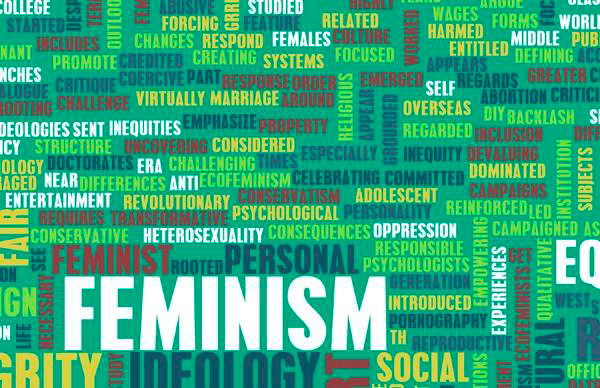 ENGL 382: Feminist Theory
ENGL 382: Feminist Theory
Thursday 4:00-6:50 p.m.
>>Instructor: Carly Thomsen
>>CRN: 16808
What does a feminist orientation feel like? What does it mean to adopt a feminist approach? How do we implement feminist theory into our lives? We will answer these questions by taking seriously the benefits and limits of the feminist maxim “the personal is political.” In so doing, we will consider the social and political structures that create the worlds we live in alongside the minutiae of the quotidian. Key topics include power, health, the state, subjectivity, the media, experience, desire, and resistance. Doing so is meant to give us tools for understanding gender, and how it shapes and is shaped by race, class, sexuality, ability, and geography, that help us to articulate more capacious feminisms—that is feminisms that are useful for examining every part of our world and ourselves, including but not limited to gender. Course texts include traditional academic articles (both foundational and contemporary), documentary films, and fiction. Course is open to all students!
Satisfies:
English major core requirement (ENGL): Diverse Traditions
English minor core requirement (ENGM): Diverse Traditions
English major specializations: Culture & Social Change (CSC)
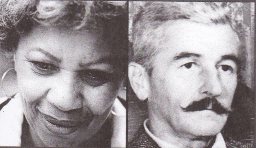 ENGL 394*: Morris/Faulkner Seminar
ENGL 394*: Morris/Faulkner Seminar
Monday 2:00-4:50 p.m.
>>Instructor: Nicole Waligora-Davis
>>CRN: 17085
This seminar places in conversation the writings of William Faulkner and Toni Morrison on race, gender, history, and American legal culture. We examine the implications of race and gender on poverty, homelessness, employment, colonialism, segregation, aesthetics, reproductive justice, healthcare, education, citizenship and due process
Satisfies:
*D1
English major core requirement (ENGL): Diverse Traditions
English minor core requirement (ENGM): Diverse Traditions
English major specializations: Culture & Social Change (CSC); Literature & Literary History (LLH)
 ENGL 397: Literature of Return Migration
ENGL 397: Literature of Return Migration
Tuesday, Thursday 2:30-3:45 p.m.
>>Instructor: Ragini Tharoor Srinivasan
>>CRN: 16810
“Return” is one of the oldest tropes in the literature of migration. For some immigrants, the pull of home is only matched by the impossibility of going back. For others, emigration away from home must eventually be consummated with a return journey. Return can be chosen or coerced. Return can be a search for roots, or a quest for routes. Return might be forbidden, illegal, barred. In all instances, return can be narrated. We might say that return itself is a narrative form. Over the course of the semester, we will read narratives of reverse migration, second-generation return, temporary return, post-conflict return, economic and labor migration, ancestral pilgrimage, and deportation. We will analyze how various temporalities of return animate the literary apprehension of the present. We will compare narratives of return across genres, as we engage in analysis of novels, memoirs, poetry, short stories, interviews, essays, and films.
Satisfies:
English major core requirement (ENGL): Diverse Traditions
English minor core requirement (ENGM): Diverse Traditions
English major specialization/s: Culture & Social Change (CSC); Literature & Literary History (LLH)
 ENGL 401: Advanced Fiction Writing
ENGL 401: Advanced Fiction Writing
Wednesday 4:00-6:50 p.m.
>>Instructor: Amber Dermont
>>CRN: 16930
A course conducted mostly as a workshop for advanced fiction writers. It will include assigned writing exercises and weekly readings of published stories to deepen students' understanding of narrative technique. Repeatable for Credit. Prerequisite: ENGL 301. Seating is limited.
Satisfies:
English Creative Writing Concentration (ECRW)
Creative Writing Minor (CREW)
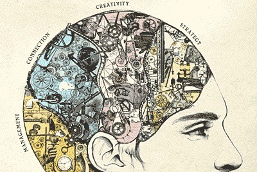 ENGL 405: Advanced Creative Nonfiction Writing - MEMOIR
ENGL 405: Advanced Creative Nonfiction Writing - MEMOIR
Wednesday 1:00-3:50 p.m.
>>Instructor: Lacy Johnson
>>CRN: 16811
“Memoir is, for better and often for worse, the genre of our times,” Sven Birkerts writes in The Art of Time in Memoir. The best memoirs don’t simply relate the events of a writer’s life from start to finish, but instead dramatize a writer’s investigation of the past. In this workshop course, we will explore how memory and forgetting, experience and perception, fact and invention, public and private history, personal relationships and geopolitical forces intersect in these investigations, both on and off the page. While we split our time between discussions of published texts and student writing, we will look closely not only at content, but also at structure and perspective. We’ll examine the myriad ways authors construct a self-as-speaker and how that differs from the self of lived experience. Prerequisite: English 305 or permission of instructor.
Satisfies:
English Creative Writing Concentration (ECRW)
Creative Writing Minor (CREW)
 ENGL 410: Senior Seminar
ENGL 410: Senior Seminar
Friday 1:00-3:50 p.m.
>>Instructors: Margarita Castromán; Lacy Johnson; Amber Dermont; Kiese Laymon
The Senior Seminar is the first course in a 2 part sequence, required of all senior English majors. An immersive, research and writing methods course, the Senior Seminar prepares students to produce a significant piece of critical or creative work, guiding each year's senior cohort through the methods and best-practices that invigorate longer-forms of creative inquiry and research. Similar to other senior design and research courses throughout the university, the Senior Seminar engages students in the deeper and more rewarding processes of sustained writing and research, and offers all students the opportunity to prepare and build an independent research project with sustained faculty support.
Satisfies:
Senior English major (ENGL) fall core requirement
Fall English major concentration requirement in creative writing (CREW): Fundamentals of Research
 ENGL 471: Early Mexican American Writing & Print Culture
ENGL 471: Early Mexican American Writing & Print Culture
Tuesday, Thursday 10:50 a.m.-12:05 p.m.
>>Instructor: José Aranda
>>CRN: 17090
This course examines the first one hundred years of Mexican American literary and print production, from 1848 to 1948. It is a period of production when neither its writers nor its texts, and especially not its print culture, were considered productive for the nation-state of either the United States or Mexico. Through the lens of liberation philosophy, coupled with nineteenth-century Latinx literary criticism, settler-colonial criticism, and critical regionalism, this course explores the cultural, political, and intellectual dimensions that underwrote how and why writers and publishers of Mexican descent established a print culture against all odds.
Satisfies:
English major core requirement (ENGL): Diverse Traditions
English minor core requirement (ENGM): Diverse Traditions
English major specialization/s: Culture & Social Change (CSC)
ENGL 493.000: Independent Study
Spring meeting times are to be determined by an English faculty member and the student (via permission of instructor; credit variable 1-6)
A course designed for students who want to pursue intensive semester-long study of a particular topic. Students must identify and receive the approval of an English department faculty member and complete a special registration form as directed. Registration is by permission of instructor.
ENGL 493.001: Independent Study-R2/Section Editors
Tuesday 6:30-9:00 p.m.
>>Instructor: Ian Schimmel
ENGL 493.002: Independent Study-R2/Editors-in-Chief
Tuesday 6:30-9:00 p.m.
>>Instructor: Ian Schimmel
Notes:
ENGL: English Major
ENGM: English Minor
CREW: English Creative Writing Minor
ECRW: English Creative Writing Concentration
AD: Analyzing Diversity
*D1: approved for Distribution Group 1
English Department Required Field/s satisfied:
Diverse Traditions: Critical Race; Post-colonial & Gender studies: RPG
Historical foundations: **pre-1800/1900 (**specifically pre-1800)
Meets Rice English major specialization/s:
Culture & Social Change (CSC)
Literature & Literary History (LLH)
Science; Medicine & Environment (SME)
Visual & Comparative Media (VCM)
Seating is limited in all creative writing courses. Registration for even-numbered sections is restricted to students who have declared the Creative Writing Major Concentration (ECRW); registration for odd-numbered sections is open to all undergraduate students in priority order.

